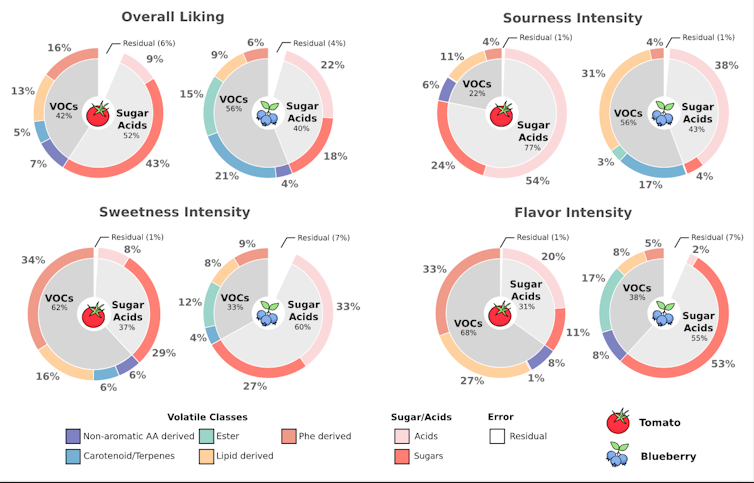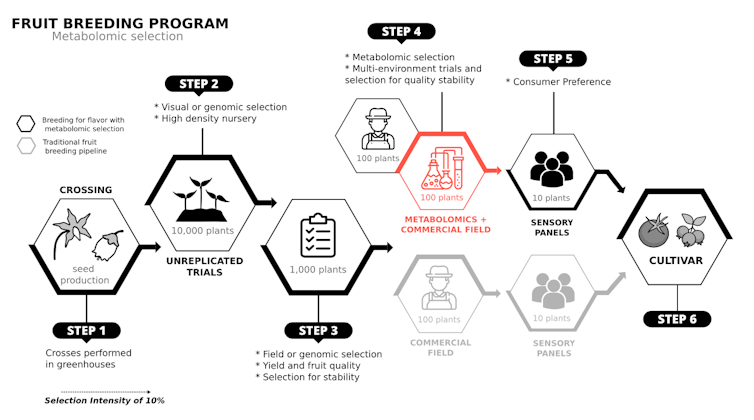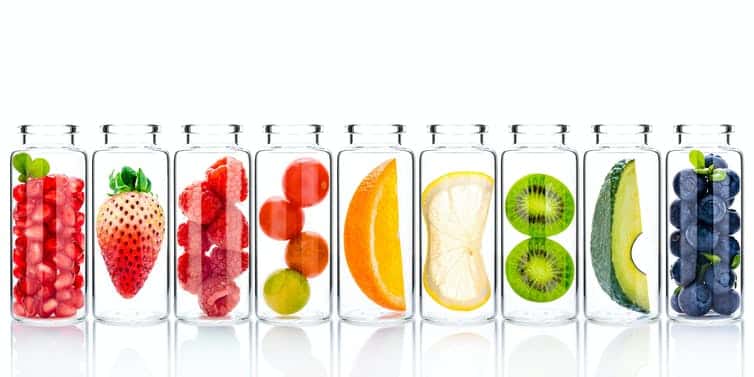Which flavours and chemical compounds make a particular variety of fruit more appealing to consumers can be identified and predicted using artificial intelligence, according to our recently published study.
Flavour, defined by scientists as the interaction between aroma and taste, is chemically complex. The sugars, acids and bitter compounds in food interact with the taste receptors on our tongues to invoke taste, while volatile compounds that interact with olfactory receptors in our noses are responsible for aroma.
Breeding for flavour is a difficult task for many different reasons. For one, fruit and vegetable plant breeding programmes need to improve several different traits that appeal to both producers and consumers. Creating the optimal genetic combination that covers all these traits is difficult, so breeding programmes often deprioritise flavour to focus on improving disease resistance and increasing yield. Plant breeders must also evaluate hundreds to thousands of potential varieties. Testing a single sample in an objective way requires consumer panels of up to 100 people, which can be expensive and impractical to arrange.
To streamline this process, we developed an algorithm to predict how consumers will rank flavour in tomatoes and blueberries. We created a database containing all known compounds associated with flavour in all varieties of these fruits. Then, we compared this database with existing consumer panel ratings on sweetness, sourness, umami and overall flavour and preference of different varieties. By modeling how consumer ratings varied with the chemical makeup of different varieties of these fruits, this allowed us to determine which compounds most influence flavour perception.


Vincent Colantonio and Luís Felipe Ferrao, CC BY-NC-ND
We found that the volatile organic compounds, or chemicals that form a gas, responsible for aroma are a big part of why people like a given variety. Specifically, we estimated that 42% and 56% of the overall preference score of a variety of tomato or blueberry, respectively, was associated with aroma.
Aroma also played a role in perception of sweetness – volatile compounds contributed 33% to 62% of how consumers rated sweetness.
Finally, we were also able to identify several chemical compounds that most contribute to this flavour and sweetness perception in tomatoes and blueberries.
Why it matters
Flavour plays an important role in which varieties of fruit people choose to eat. We believe that our models can help plant-breeding programmes develop more flavorful varieties of fruit by making it easier to determine what objectively makes one variety taste better than another without needing to gather large consumer panels. By identifying exactly what influences how people perceive flavour, plant breeders can focus on optimising for a specific chemical compound instead of a more subjective rating of flavour.


Vincent Colantonio and Luís Felipe Ferrao, CC BY-NC-ND
What still isn’t known
Because genetic and cultural factors greatly influence taste preferences, it’s likely that flavour preferences will also vary among different ethnic and geographic groups. While our results may be representative for the average U.S. consumer, they may not predict consumer preferences as accurately in Asia, for example. Breeding fruit varieties for specific markets might require additional testing of our flavour database.
What’s next
Next steps include breeding fruits to increase the key volatile compounds that determine how much a consumer likes a particular variety.
Our team has previously shown that modern commercial varieties of tomatoes contained significantly lower levels of many important chemicals that make heirlooms more flavorful. Restoring these chemicals to the same levels as heirlooms and testing whether that makes these commercial varieties more flavorful is an ongoing area of study.
How we do our work
Our lab groups have spent decades developing a framework to understand the genetics and biochemistry of fruit flavour. We conduct highly interdisciplinary research with psychologists, food scientists, geneticists, biochemists and plant breeders.
In our research, we start by identifying what chemicals in a fruit are responsible for flavour preferences. We then determine how the plant makes those chemicals and develop a genetic road map to control how the plant produces these chemicals. Finally, we use molecular breeding to produce flavorful varieties that consumers can fully appreciate.
[The Conversation’s science, health and technology editors pick their favourite stories. Weekly on Wednesdays.]![]()
![]()
Marcio Resende, Assistant Professor of Horticultural Sciences, University of Florida and Harry J. Klee, Professor of Horticultural Sciences, University of Florida
This article is republished from The Conversation under a Creative Commons license. Read the original article.

